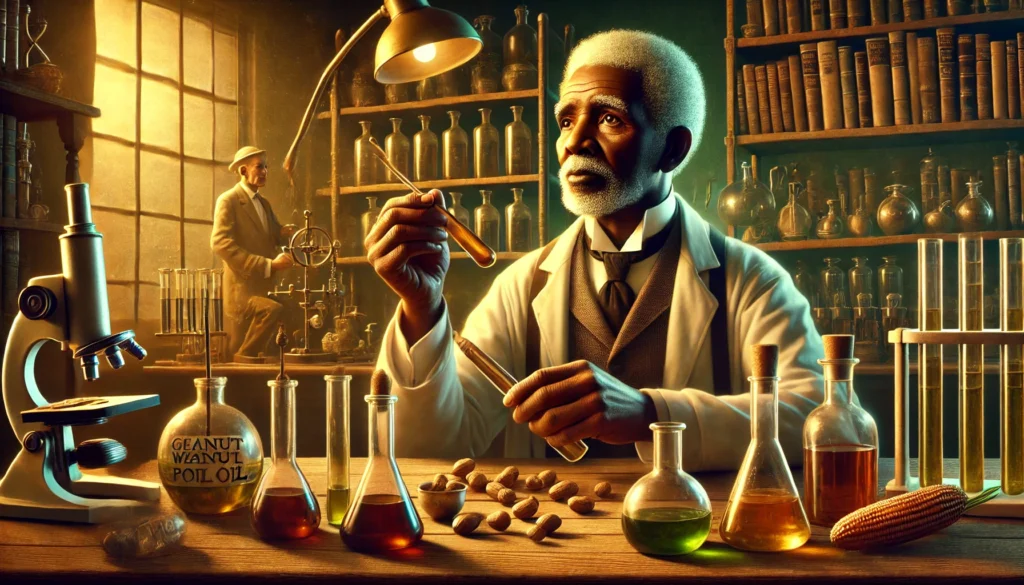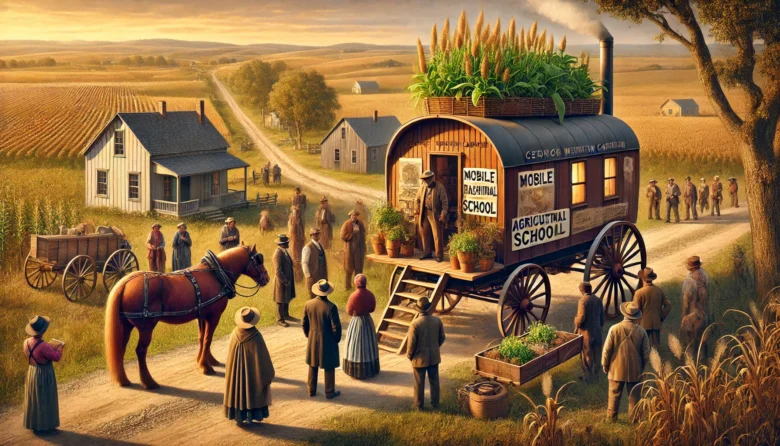Fun Fact: George Washington Carver developed over 300 uses for peanuts, including peanut butter, glue, and even paint!
Imagine transforming simple crops like peanuts and sweet potatoes into hundreds of practical products that changed industries. That’s the legacy of George Washington Carver, an agricultural scientist, inventor, and educator born into slavery in 1864. Carver’s groundbreaking work not only improved the livelihoods of farmers but also demonstrated how science can uplift entire communities. Let’s explore the extraordinary life of this innovative genius.
A Humble Beginning
George Washington Carver was born in Diamond, Missouri, toward the end of the American Civil War. Orphaned as an infant, he was raised by his former enslavers, Moses and Susan Carver, who encouraged his love of learning. Despite limited resources, George’s curiosity about plants and the natural world flourished.
Anecdote: As a child, Carver would explore the woods near his home, earning the nickname “The Plant Doctor” from neighbours who sought his advice on gardening issues.
Education Against All Odds
Carver’s determination to get an education was relentless. Denied schooling locally due to racial discrimination, he walked miles to attend schools for Black children. He eventually completed high school and pursued art studies at Simpson College in Iowa. However, a professor recognized his talent in botany and encouraged him to switch to agricultural science. Carver later transferred to Iowa State Agricultural College (now Iowa State University), where he became the institution’s first Black graduate and earned both a bachelor’s and master’s degree.
Impactful Decision: Carver’s shift from art to science was pivotal. While he remained an artist at heart, his scientific work would revolutionize agriculture.

Championing Sustainable Agriculture
In 1896, Carver joined the Tuskegee Institute (now Tuskegee University) in Alabama, where he dedicated his career to agricultural research and education. He promoted crop rotation and soil enrichment to help Southern farmers restore the fertility of their depleted lands.
The Peanut Revolution: Carver is best known for his work with peanuts. However, he didn’t just advocate for peanut farming; he invented over 300 peanut-based products, including:
- Peanut oil and peanut butter.
- Cosmetics like peanut-based face creams.
- Industrial products such as plastics and rubber substitutes.
Case Study: During World War I, Carver’s peanut-derived materials provided substitutes for imported goods, showcasing the practical applications of his research.
Beyond Peanuts: A Multifaceted Innovator
Carver’s ingenuity extended to sweet potatoes, soybeans, and pecans. He developed 118 products from sweet potatoes, including flour, vinegar, and even rubber. His holistic approach to science emphasized finding value in overlooked resources.
Outreach to Farmers: Carver’s mobile agricultural schools brought knowledge directly to farmers. He demonstrated techniques like composting and crop diversification, enabling them to maximize yields and improve sustainability.
Personal Philosophy and Impact
Carver’s faith and humility shaped his work. He believed his discoveries were gifts from God to serve humanity. Despite his fame, he lived modestly and refused to patent most of his inventions, prioritizing public benefit over personal profit.
Quote: “It is not the style of clothes one wears, neither the kind of automobile one drives, nor the amount of money one has in the bank, that counts. These mean nothing. It is simply service that measures success.”
Advocacy: Carver’s lectures and collaborations with leaders like President Theodore Roosevelt and Henry Ford helped bring attention to agricultural reform. Carver became a symbol of resilience and creativity, inspiring future generations of scientists and inventors.
Legacy and Recognition
Carver’s contributions transformed agriculture and uplifted countless farmers. Though he passed away in 1943, his legacy endures through:
- The George Washington Carver National Monument in Missouri—the first dedicated to an African American.
- Numerous schools, programs, and awards honour his name and work.
Modern Relevance: Carver’s emphasis on sustainability and resourcefulness is more relevant than ever. As the world faces challenges like climate change and food security, his methods offer valuable lessons for sustainable development.
Conclusion
George Washington Carver’s life is a testament to resilience, creativity, and the transformative power of education. From his humble beginnings to his groundbreaking scientific achievements, Carver showed how one person’s passion and dedication can change the world. His story reminds us of the importance of using knowledge for the greater good.
What lessons do you draw from Carver’s incredible journey? Share your thoughts in the comments below!
Author’s Note:
Researching George Washington Carver’s life has been deeply inspiring. His story of triumph over adversity and his commitment to serving humanity through science is a beacon of hope for all of us.
G.C., Ecosociosphere contributor.
References and Further Reading:
- The George Washington Carver National Monument
- Tuskegee University Archives: George Washington Carver
- TOP 25 AUTOMOBILE QUOTES (of 351) | A-Z Quotes. https://www.azquotes.com/quotes/topics/automobile.html





Comments
I was suggested this web site by my cousin Im not sure whether this post is written by him as no one else know such detailed about my trouble You are incredible Thanks
I’m so happy to read this. This is the type of manual that needs to be given and not the random misinformation that is at the other blogs. Appreciate your sharing this best doc.
Excellent post. I will be going through many of these issues as well..
I really love I enjoy your feed. Found you while checking out .
A truly inspiring tribute to a pioneering genius. This write-up beautifully honors Carver’s legacy and the impact of his sustainable innovations.